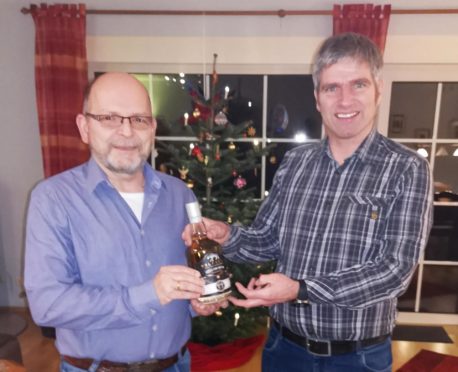The owners of a rare whisky distilled in Caithness have donated the proceeds of its sale at auction to the Thurso lifeboat.
Eight whisky enthusiasts from across Europe bought a cask from the Wolfburn Distillery in Thurso in 2013.
They decided to donate the outcome of the auction earlier last month to the local RNLI station.
While the bottle itself made £190, auction platform whiskyauction.com added an additional 1,000 Euros after being told the profit was going to the RNLI – taking the total to £1,053.
The owners stated: “Volunteers risk their own lives to save people in distress at sea.”
Michael Martin and Markus Knigge, two of the shareholders who hail from Germany, said: “We would like to take this opportunity to thank the Wolfburn staff.
“Whiskyauction.com also supports the campaign with an additional donation. It was a good opportunity for Wolfburn fans to get a rare bottle cask strength Wolfburn and support the brave people from RNLI who risk their lives at sea.”
The bottle was a privately-owned Wolfburn Quarter Cask – a 120-litre refill Bourbon Quarter Cask with the number 176.
It was filled in 2013 and was bottled at the end of 2020, making it one of the oldest Wolfburn expressions currently available.
Thurso RNLI spokesman Ron Gunn said: “We are always extremely grateful of any donations and they can come from a variety of contributors.
“I think this is the first time we have received a donation via the sale of a bottle of rare whisky from our local Wolfburn distillery. The crew would like to thank everyone concerned for this kind donation.”
It was in 1821 that William Smith founded a distillery on the outskirts of Thurso and named it Wolfburn after the watercourse it drew from.
It stopped producing later in the century and only reopened at a new building in 2013, just a short walk along the burn from the old site towards the sea.
The Wolfburn logo was taken from a drawing by Conrad Gessner, the 16th-century linguist and zoologist, and appears in his work The History of Four-footed Beasts and Serpents.
In Gessner’s day the wolf was a common sight in the far north of Scotland and on the coast it was said to have a supernatural relative: the sea-wolf.
The sea-wolf is also said to bring good luck to all those fortunate enough to see it.
